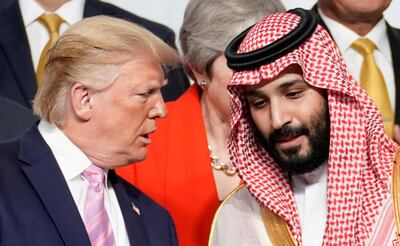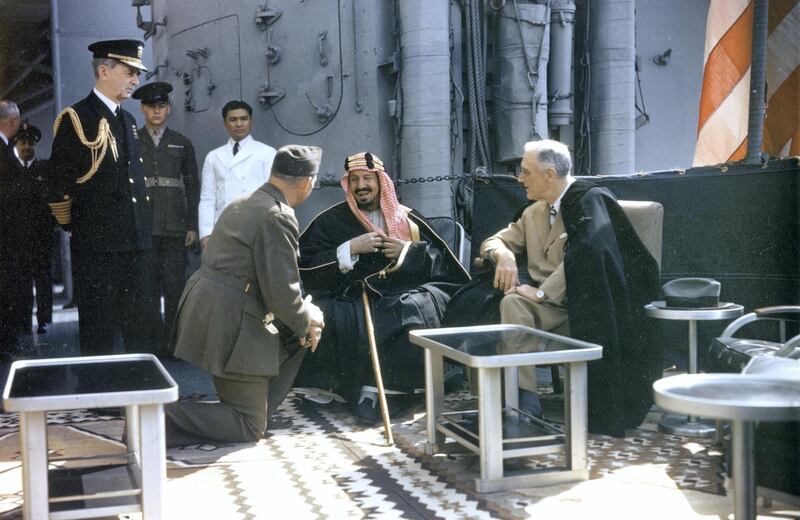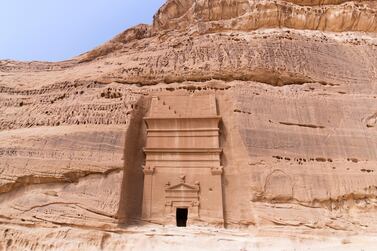US President Franklin Delano Roosevelt’s first meeting with Saudi King Abdulaziz Al Saud, just weeks before Roosevelt died, set in motion the longest formal relationship between the US and an Arab nation.
Seventy five years on from their 1945 meeting on the USS Quincy cruiser in the Suez, Washington and Riyadh continue to collaborate on regional, economic, defence and security issues. But the relationship is experiencing rough tides as differences over regional conflicts and broader global shifts that involve Russia and China widen.
The Roosevelt-Abdulaziz meeting at the end of the Second World War charted a new course for the kingdom: one that was closer to the allied powers and economically tied to the West. Nine years before the meeting, the Texas Oil Company (Texaco) built a partnership in Saudi Arabia and launched the Arabian American Oil Company, or Aramco. On defence, the relationship has only grown closer, with the US selling $90 billion worth of military equipment in the last 75 years, the US Defence Department said.
In major strategic tests during the Cold War and the Iraqi invasion of Kuwait, Saudi Arabia and the US joined hands.
But differences discovered in that very first meeting also endure today.
When Roosevelt asked the Saudi king to accept Jewish immigration into Palestine under the British mandate and the establishment of the state of Israel, the Saudi monarch reportedly answered with one word: “no”.
While the Saudi position has evolved over time — with the kingdom presenting the Arab Peace Initiative in 2002 that promised normalisation with Israel if it withdrew to the 1967 borders — it is still remarkably far from US feelings on the matter.

On Thursday, Saudi Foreign Minister Prince Faisal bin Farhan said Riyadh’s position remained "consistent" and that there was no truth to claims of a Saudi-Israeli meeting being held.
He told Al Arabiya channel that any normalisation between Arab states and Israel had to follow a settlement between the Palestinians and the Israelis. Other contentious moments include the US invasion of Iraq, the killing of Jamal Khashoggi, and Saudi Arabia’s ever closer ties with China.
Karen Young, resident scholar at the American Enterprise Institute (AEI) described the US-Saudi relationship as based on mutual need and interests. "They reflect an understanding that we do need each other, and sometimes use each other … it has been tactical, often transactional, and consistently flexible," she told The National.
While all US presidents since the 1970s have visited Saudi Arabia during their term, the relationship took a more personal turn with Donald Trump. The current US president brags about his own relations and phone calls with King Salman, and his adviser and son-in-law Jared Kushner has a good working relationship with the Crown Prince, Mohammed bin Salman.
But Ms Young views these unconventional channels of communication as problematic for the relationship as it stokes partisan bickering in the US halls of government. “It needs to be formalised and normalised, as a personalisation of the relationship under the Trump administration has done no favours for Saudi Arabia or the US,” Ms Young said.
Formalising the relationship, she explains, “means communications need to be through diplomatic channels, not private messaging”.
US Secretary of State Mike Pompeo has increased the State Department’s role in steering the relationship since taking office in April 2018. As he embarks on another trip to Saudi Arabia next week, Ms Young sees a need for Riyadh to establish good relations “with Congress, the military and intelligence communities, as well as the US business community — to be above party”.
In an election year, Democratic candidates have criticised Saudi Arabia’s involvement in Yemen, human rights record and close relationship with Mr Trump. But Congress has so far held off on sanctions that target the kingdom, and a general consensus on repairing the relationship, not jeopardising it, still stands in both parties.
Yasmine Farouk, a fellow in the Middle East Programme at the Carnegie Endowment for International Peace, described a “gap of expectations” in the relationship between Riyadh and Washington.
“The Trump administration’s approach is transactional,” Ms Farouk said. She explained that the US wants Saudi Arabia to help in reducing the American military footprint in the region, increase pressure on Iran, improve ties with Israel, and manage regional conflicts. On the other hand, Saudi Arabia “expects the treatment of an ally”.
But in reality, the US has only increased its military footprint in the Gulf region in the past two years following suspected Iranian attacks on tankers and the cruise missile attack on Aramco oil installations in Saudi Arabia.
Mr Trump authorised the deployment of 3,000 US troops to Saudi Arabia, to be stationed at the newly reopened Prince Sultan Air Base, more than a decade and a half after American troops left. The base was first used by US in 1990 during the liberation of Kuwait but US troops departed in 2003 following the invasion of Iraq.
On Yemen, the US has encouraged Saudi-Houthi negotiations to end the conflict, and the file will top Mr Pompeo's agenda. "Yemen will feature prominently" a senior US official told The National. "There has been a de-escalation effort under way here for a couple of weeks."
Seventy-five years on from the Roosevelt-Abdulaziz meeting, Ms Farouk sees a need for “a frank discussion” between the two partners to ensure their long-standing interests but also show limits of ongoing regional policies and differences among them.








